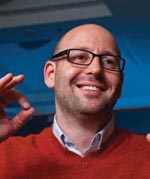

LA JOLLA, California — Dr. Itamar Kahn is a distinguished Israeli professor at the Technion, focused on Neuro-degenerative diseases research, at its Prince Center. His biography is most unusual. Interest early on, with a B.S. in computer science from Ben Gurion University, gave him an entrée into neurosurgery operating rooms, where he supported the surgeons by creating MRI images of the patients’ brain structures which enabled efficient, safe surgical strategies in real time.
After 10 years in the USA, he returned to Israel where he secured a research position at the Technion. Professor salaries in all Israel universities are identical and relatively modest compared to the USA. What cost the Technion most dramatically was its investment in Kahn’s specific laboratory, $2,500,000. For his work with mice, in particular, he needed a customized miniature functional MRI machine.
As an aside, early on he had to make a decision whether to attend an Israeli medical school versus accepting the Ph.D. program at MIT. He chose MIT, which led to intra-family application of the classical Jewish family notion of ‘my son, the doctor.’ His grandmother hounded him to accept medical school! He prevailed, to bubbe’s chagrin.
His research has led to a fundamental understanding that the major neuro-degenerative disorders are due to disruptions in communication activity between neurons. This is true for autism, Parkinson’s Disease, Alzheimer’s, macular degeneration, and others, whether due to genetics or acquired after birth
It is possible, by insertion of genetically abnormal DNA into mice, to create mice with analogs to such human conditions as autism or its ‘opposite,’ Williams Syndrome. Classic autism is characterized by reluctance to socialize, whereas Williams’ main feature is to socialize. When he placed ‘normal’ mice in a situation whereby they can move right to visit an inanimate object, or left to visit another live mouse, the mouse will spend equal amounts of time visiting both. A mouse made genetically autistic, in the same situation, will choose to visit only the inanimate object. A mouse made into Williams Syndrome will choose only to visit the other mouse. When the genetically revised mice are reversed to ‘normal,’ they behave like the normal mouse above.
Neuro-degeneration of aging begins at about age 30 in humans. Professor Kahn studies such diseases of degeneration focuses on ‘disrupted neuron communication.’ He has explored agents that interfere with the disordered symptoms, to ameliorate those symptoms. Successes so far slow down the progression of symptoms, e.g. in Parkinson’s, but do not reverse the actual neuronal degeneration. That’s for the future, perhaps through more perfected stem cells than are available today.
In animals, created stem cells show signs of such correction. Unintended consequences are the big concern for future applications to be considered in humans.
Another approach is to determine ways to disrupt the ‘blood-brain barrier’ to permit direct delivery of agents which overcome the dis-communication between neurons in neuro-degenerative conditions.
Kahn was queried by a number of residents of the Vi, pre-occupied with their own versions of the conditions he discussed, from benign tremors to Parkinson’s, Multiple Sclerosis, and so forth.
His appearance was facilitated by Mark Greenberg, Director of the San Diego Chapter of the American Technion Society. Greenberg can be reached at 858-336-6536 or 858-750-2135, or via e-mail at mgreenberg@ats.org He can arrange tours of the Technion in Haifa, consultations with Technion faculty, and opportunities to donate to that world-class facility, already the recipient of three Nobel Prizes.
*
Dr. Jacobs is a freelance writer based in La Jolla.